
2021/2022 Capable Communities Strong Families Thriving Children
Performance and Impact Report
Acknowledgements
Family Life is an inclusive organisation. We welcome, embrace and encourage the diversity of all of our staff, volunteers, clients and community. Family Life, and all the individuals who make up our organisation, respectfully acknowledge the Traditional Owners of the country on which we live and work. We especially acknowledge the Boon Wurrung / Bunurong people, and other peoples of the Kulin nation on whose ancestral lands Family Life provides services to the community. We pay our respects to Elders past, present and emerging and acknowledge their living culture and centuries of custodianship of these lands, which were never ceded. We acknowledge that the land on which we stand always was and always will be Aboriginal land.



2
Foreword

As Family Life emerges from the period of mandated social distancing arising from the COVID-19 pandemic, we have reflected on the experiences of our communities, clients, staff and volunteers and reviewed the innovative methods we employed to support the community, strengthen families and enable children to thrive.
Prior to 2020 it would have been almost impossible to envisage providing ongoing family assessment and support without the physical proximity of meeting at a client’s home, community location or an office. We certainly would not have considered the concept of online men’s behaviour change programs or delivering trauma informed care training to our practitioners online. Dramatic disruption fostered innovation and required our practitioners “to be craftspeople and improvisers, and to draw on their skill, intuition, ritual and courage as much if not more than organisational rules1”.
Essentially we achieved the approach recommended by renowned child psychiatrist and neuroscientist, Dr Bruce Perry, remaining “physically distant but emotionally close2”. This report tells the story of the legacy of the enforced period of creativity that accompanied COVID-19. We see it reflected in our work relating to each of Family Life’s Strategic Pillars for both the financial year 2021/2022 and in the forward planning process for the coming year. We were able to develop and deliver our key programs, services and practice development activities both in person and digitally, enabling us to expand our reach and overall impact.
The COVID-19 pandemic illuminated the value of Family Life’s comprehensive suite of wrap around support services for families and children. We have been able to refer clients undertaking family dispute resolution at Family Life to our specialist family violence support services when appropriate, and, when men complete a Men’s Behaviour Change program, they can access post participation support through our Families and Communities program. This includes access to our Dads In Focus program
1. Schmid & Bradley. (2022).
2. Psychology Today. (2020).
which is a modularised trauma informed program focusing on fathering after family violence. This wrap around approach addresses some of the risk factors associated with a poorly connected and overstretched service system.
Reports of domestic abuse and family violence increased around the world since social isolation and quarantine measures came into force, placing increased demand on services. As we emerged from lock downs and other restrictions, impacts of the pandemic such as financial stress, mental health concerns and housing instability continue to place pressure on families and communities. The pandemic created opportunities to adopt technological innovations and new service delivery models to manage the safety of victim survivors and keep perpetrators in view, and this was most evident in our expansion of family violence services. During the reporting period we delivered up to 26 groups a week with a mixture of online and face to face groups, depending on COVID-19 restrictions. This work also provides opportunities to connect with victim/survivors and ensure that they are linked with and supported by our services. During the reporting period, 2,544 families received support through our Family Violence Services, an increase of 107% from the previous year.
We share with pride our story of innovation and adaptation as we continue to support children and families to thrive in times of challenge and uncertainty.
Allison Wainwright Chief Executive Officer


Family Life - Performance and Impact Report | 2021/2022 3
Our client contact hours, focused interventions and open active cases increased notably during the reporting period. This reflects increased service provision for men accessing our court-mandated Men’s Behaviour Change Program, an overall increase in demand for other specialist family violence services and a greater number of families accessing parent and child support services. Whilst our community capability interventions decreased (again this period was impacted by COVID-19 and restrictions), there was a sharp increase in those attending a Family Violence Community Intervention3.
2,145
individuals were supported through our Family Law Services. 223
individuals volunteered with Family Life throughout the year.
20,249
hours of community service were provided by our volunteers.
3,632
participants attended Family Life Community Capability interventions. 7,463
families were provided with a focussed intervention across all Family Life services. 72,744 users accessed our Family Life website, this was an increase of 34.49%.
Our clients reside in 250 different postcodes
across Victoria4 and we travelled a total of 35,000 kms to deliver outreach services in some of these postcodes.
Our service delivery footprint reached 73 different Local Government Areas (LGAs) with our biggest footprint (21% of cases) being in the Frankston LGA.
3. Please note that the figures presented in this report reflect the experiences of clients who completed the Family Life Client Satisfaction Survey and/or program specific outcome measures.
4. This has increased from 216 when compared to the previous financial year.
4
How much did we do for our children, families and our community?
individuals participated in our services, social enterprise, community engagement and Community of Practice activities this year.
11,331 u
700
individuals received low intensity mental health support.
2,626
families received support through our Family Violence Services.
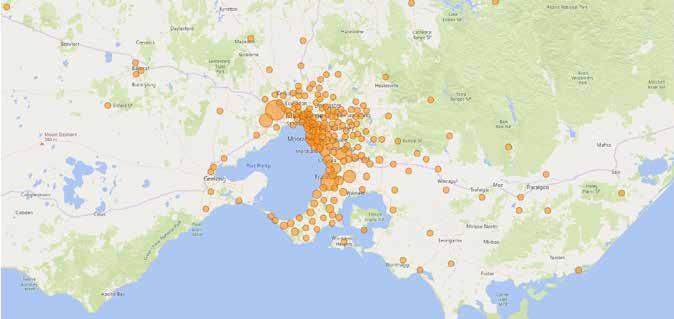

During the financial year, 60,327 sessions
were conducted across all of our programs and services.
Various modes of contact were offered to satisfy the needs of our clients, including face to face, online/video and phone.
Please note that the figures presented in this report reflect the experiences of clients who completed the Family Life Client Satisfaction Survey and/or program specific outcome measures.
Family Life - Performance and Impact Report | 2021/2022 5
Consultation with Service Users
90%
of adults felt that the service listened to them and understood their issues
Client and Participant Satisfaction Adults
90%
of adults feel better able to deal with the issues that they asked Family Life to help them with
90%
of adults are satisfied with the service they received from Family Life
84% of adults satisfied with the way they received the services from Family Life
Improved emotions, confidence and hope
“I was at the lowest point of my entire life. Everything felt so incredibly bleak. With your support, it brought back hope when I needed it most.” “My worker has helped me so much and has given me so much advice that has completely changed my negative thoughts, I am going to be the best version of myself for my child.”
Children’s improvement
“After months without going to school, I am very happy that now he is going 2 days a week. I know it takes time but seeing what he is doing now is great!” “I have seen a huge improvement in my child; and have sought further support through a psychologist and paediatrician as recommended.”
Improved parenting skills
“The children didn’t listen to me and they helped me with advice to know what to do with my children. The children have improved.” “Made me understand about our kids and how they are delicate. It taught me to see different angles.”
Stronger family
“People that are close to us have noticed the improvement within our relationship and I tell them it is definitely thanks to Family Life and our practitioner.” “Because of your service, we grew into a bigger and stronger family unit. Your support and encouragement has allowed my daughter to blossom into a nurturing mother to her daughter and it gave her the confidence to stand on her own two feet and be happy with who she is.“
6
Client Feedback
What Do People Like About Our Service?
Worker’s unconditional support and understanding
“My worker was lovely and really listened to our family situation and problems. There was no judgement which made it very easy for me to be honest and to accept the help that was offered. I felt very relaxed and knew that my worker had my family’s best interests in mind.” “At the beginning I thought it was just another service, but I actually found out how fantastic it is. You have a great service and an amazing worker.”
Efficient communication
“Good open communication and understanding environment.” “The worker was talking to my daughter. My daughter was listening and getting better.”
Information, resources and advice provided
“My worker was fantastic at talking me through my options to budget and help get my family on track with our money.” “My worker worked hard to find solutions for me that I never would have done without her. My worker guided me to seek help for my daughter’s mental health and learning difficulties which worked well.”
Help to access support services
“I really liked how they linked me with other services to help my kids.” “For me, trying to get contact with services is difficult. Having family life coordinating those services has shortened the time and has made access easy and fast.”

| 7
The People Behind the Statistics
Case Study Dads In Focus (DIF)
Marcus
Marcus commenced with Family Life in late 2021 when he was referred to the Dads in Focus (DIF) program as directed by the Family Court. At this time Marcus advised that he had not been able to see his almost 5 year old son for two years following a family violence incident that saw him removed from the family home and served with an intervention order.
Marcus had struggled with drug use for a number of years and when his wife would challenge him on this he would lie and become aggressive using physical, emotional and psychological abuse. The program supported Marcus to acknowledge that his behaviour was abusive and that his wife felt fearful and uncertain as a result.
Marcus embraced DIF from the outset, identifying that the intervention was positive for him because it was an ‘impartial ear’. Marcus identified a number of goals from the outset which included gaining insight into how his behaviour has impacted his ex-wife and son, to rebuild a connection with his son and to navigate co-parenting whilst taking his Intervention and Family Court orders into consideration.
Upon commencing DIF, the Family Court allowed Marcus to begin fully supervised access visits with his son once per week for a period of 2 hours and a Facetime call once per week. Marcus experienced a lot of anxiety around reconnecting with his son after missing the last two years of his life. DIF sessions were used to explore not only his anxieties but also to look at practical things he could do to slowly build a relationship with his young son without overwhelming them both. He used the sessions to share his concerns and anxieties and to work on practical strategies to manage these and
in turn the bond between Marcus and his son soon developed into a flourishing relationship.
The Dads in Focus sessions also focused on child development and safety, parenting skills and Marcus’s own experiences growing up as a child, and explored the impacts of his behaviour on his ex-wife as both an individual and a mother.
The Dads in Focus Program supported Marcus to shift from a place of resentment, frustration and anger (with no access to his son), to a place of empathy, compassion and understanding for his ex-wife.
He was able to understand more about rebuilding trust and safety within the family unit and gained practical strategies to facilitate this. Through the DIF intervention Marcus had an opportunity to explore his own values, beliefs and attitudes that contributed to his use of family violence, the impacts of this on his ex-wife and his son and explore real life strategies to assist in reconnecting and building strong and healthy bonds with his son.
*All men are assessed for suitability to participate in the Dads in Focus program. The overall priority for all our family violence work is the safety of women and children. A key component of all of our men’s behaviour change work is family safety contact with former or current partners with a focus on safety for the current or former partner and children and young people.
8

9 Family Life - Performance and Impact Report | 2021/2022

10
Case Study
Leena
Leena is a central Asian female in her late 30s. She is married, has two children and has been living with her husband and his parents in Melbourne for almost 20 years. Leena is employed and avoids interaction with her ethnic community.
She had sponsored several extended family members to come to Australia from overseas, which cost her a great deal of money. After their arrival, they began having some relationship issues often resulting in arguments. A family violence incident occurred whereby Leena’s window was smashed, resulting in Leena receiving minor cuts and needing to be taken to hospital.
Leena was very emotional and sad when she shared her feelings and thoughts about the stressful events. She stated that police were informed and attended due to the family violence incident. Leena discussed the legal aspects of the intervention order, which was taken out by the police. Leena stated that she was not the same person after the incident and was struggling with daily routines, forgetting things. She reported feeling guilty for bringing her extended family members to Australia and stated that she no longer felt safe in her own home.
The Peer Support Worker (PSW) provided confidential space and emotional support, completing a risk assessment and safety plan with Leena through consultation with Family Life’s specialist family violence practitioners. Leena was also advised of the suite of family violence support services offered by Family Life.
The PSW provided the information/contact details of the Victoria Legal Aid and Monash Legal Aid Services and encouraged Leena to access the services for further legal support.
The PSW spoke with Leena about what stress and anxiety looks like and the importance of stress management techniques. Leena and the PSW focused on deep breathing exercises and positive thinking and Leena was encouraged to see her GP to discuss a Mental Health Care Plan. In addition, the PSW spoke with Leena about the steps to access a psychologist throughout referral to the Primary Health Network if required. Leena advised the PSW that she was grateful that in the Connect program she was able to speak in her native language and with someone who understands the culture. Leena was thankful for all of the Peer Support Worker’s support and stated that she will encourage her parents and husband to access the program too and possibly obtain a referral to Family Life’s family and relationship counselling services for further support.
Family Life - Performance and Impact Report | 2021/2022 11
Connect
Outcomes Measurement Report
Capable Communities
All of the students
• reported feeling more confident in approaching someone who may be developing a mental health problem or experiencing a mental health crisis after participating in the Youth Mental Health First Aid coordinated by School Focused Youth Services.
• reported feeling more confident in offering a person information and support about mental health problems after participating in the Youth Mental Health First Aid coordinated by School Focused Youth Services.
Adults, young people and children learn and participate within supportive communities.

in our Connect program agreed or strongly agreed that they developed a better understanding of the importance of family and friends in their life.
participating in our Integrated Family Services (IFS) program experienced improvement in their progress to work, and enhancing their employment chances.
reported feeling more connected to other people at school after participating in the School Focused Youth ‘Positivity Leadership Activated Youth’ program.
reported feeling connected to their peers after participating in the School Focused Youth Services ‘Martial Arts Therapy’ program.
64% of young people in our SHINE program demonstrated the capacity to get on with their education and/ or work at the conclusion of the service compared to 50% at commencement.
12
All of the primary carers/ parents
53% of students
88% of students
98% of participants
Outcomes Measurement Report
Strong Families
75% of the primary carers/ parents in our Integrated Family Services (IFS) program experienced improvement in their ability to look after their physical health and lifestyle.

95% of participants in our Connect program agreed or strongly agreed that they have a better awareness of coping strategies for sustainable self-management.
48% of the young people5 of the young people in our SHINE program demonstrated the capacity to improve their health and wellbeing at the conclusion of the service compared to 29% at commencement6.
90% of participants in our Connect program agreed or strongly agreed that they understand the link between healthy food and better mood.
All of the participants in our Men’s Behaviour Change program established the capacity to choose safe actions and reactions at the conclusion of the service compared to 40% at commencement7.
89% of the participants10 in our Dads in Focus program showed willingness to be a good father at the conclusion of the service compared to 33% at commencement.
5 The change was statistically significant. Wilcoxon signed ranks test (Z= -2.949, P= 0.003)
6 If the difference is statistically significant, it implies that the service contributed towards this difference.
7 This data represents a sample size of participants where an outcome measure was completed at closure
8 The change was statistically significant. Wilcoxon signed ranks test (Z= -2.575, P= 0.01)
9 The change was statistically significant. Wilcoxon signed ranks test (Z= -2.517, P= 0.008)
10 The change was statistically significant. Wilcoxon signed ranks test (Z= -2.836, P= 0.005)
58% of students reported feeling better able to express their emotions in a healthy way since participating in the ‘Tomorrow Man Tomorrow Woman’ School Focused Youth Services program.
83% of the participants8
• in our Dads in Focus program demonstrated the capacity to adopt more positive and respectful thinking and attitudes at the conclusion of the service compared to 33% at commencement.
• in our Dads in Focus program experienced improvement in their capacity to communicate and resolve disagreements healthily9.
13
Families experience positive wellbeing and strong respectful relationships.
Family Life - Performance and Impact Report | 2021/2022
Outcomes Measurement Report
Thriving Children
of the young people in our ‘Map Your World’ program11
Children
60%
of
showed willingness to seek support from people around them at the conclusion of the service compared to 78% at commencement12.
of the young people participating in our Integrated Family Services ‘IFS’ program13
demonstrated the capacity to contribute to the community at the conclusion of the service compared to 78% at commencement.
primary carers/ parents

in our SHINE program demonstrated the capacity to set appropriate boundaries and keep their children within them at the conclusion of the service compared to 47% at commencement.
All of the students reported feeling more responsible since participating in the School Focused Youth Services ‘Positivity Leadership Activated Youth’ program.
88% of students
demonstrated the capacity to make good choices and develop safe behaviour at the conclusion of the service compared to 66.7% at commencement.
52% of young people
reported feeling more confident in their abilities to positively connect with peers and teachers since participating in the School Focused Youth Services ‘Positivity Leadership Activated Youth’ program.
60% of
students
reported feeling more confident in themselves since participating in the School Focused Youth Services ‘Marshal Arts Therapy’ program.
100% 11 The change was statistically significant. Wilcoxon signed ranks test (Z= -2.887, P= 0.004) 12 This data represents a sample size of participants where an outcome measure was completed at closure 13 The change was statistically significant. Wilcoxon signed ranks test (Z= -2.646, P= 0.008)
in our SHINE program demonstrated the capacity to manage difficult feelings and behaviour at the conclusion of the service compared to 24% at commencement.
All of the primary carers/parents
participated in our ‘Community Bubs’ program established the capability needed to be able to connect with their baby at the conclusion of the service compared to 50% at commencement.
14
and young people experience optimal development and are safe from harm.
Children’s and Young People’s Voice
During this financial year we consulted with children and young people to determine the way in which they feel most comfortable providing feedback about their service experience with Family Life, as well as what is most important and helpful to them when engaging with Family Life practitioners. Services across the organisation were invited to engage in this process and nominate children and young people who were comfortable to participate in this project. In total 15 children and young people participated.
76%
of
The result is a child friendly video that will allow us to share it as part of the information provision/ consent process as we commence service with children, young people and their families.

The other result is a child and young person feedback tool that will allow children and young people to provide feedback about our services. This will be implemented in the next financial year.
believe that they gained new skills to use if problems or issues arise in the future, while the rest of them were not sure about that.
For this financial year, 27 surveys were completed by children and young people supported by the SHINE team. Overall, there was positive feedback among children and young people who received SHINE services. All participants felt that they were listened to and supported, and liked their time with SHINE workers.
feel that SHINE workers were supportive of them
Family Life - Performance and Impact Report | 2021/2022 15
100% of young people and children like spending time with SHINE workers
100% of young people and children feel that they were listened to 100% of young people and children
Hi, we’re just kids, maybe like you! opening scene shows kids waving to the camera Script Animation
the young people and children participants
Family Violence Services Snapshot
An all-of-family approach
Family Life has a proud tradition of developing innovative responses to family violence. Our organisation was one of the first providers of Men’s Behaviour Change services in Victoria and is now the largest provider of these programs statewide.
Family Life also delivers specialist family violence women and children’s counselling services. Our Dads In Focus program provides individual, modularised men’s behaviour change support for men using violence, with a focus on their role as fathers. Our organisation is also funded to deliver an intensive case management service for men using violence, providing tailored therapeutic responses, with a focus on managing complex issues
Performance:
Our specialist family violence services supported
Support around family violence was the main priority, however the following needs14 intersected with client experience and were also addressed:
Current or recent experience of family violence
Mental health concerns
during the financial year.
Emotional regulation
Financial concerns
of individuals/families identified three or four of these additional vulnerabilities, and
19%
Conflict/Relationships concerns
Impact:
of participants in our Men’s Behaviour Change program
demonstrated the capacity to communicate in a respectful way, this was an improvement from 20% at the beginning of service.
participants in our Men’s Behaviour Change program
reported that their capacity to take safe actions and reactions improved, this was an improvement from 40% at the beginning of service.
the participants in our ‘Dads in Focus’ program15 showed willingness to take responsibility for their violence and abuse at the conclusion of the service compared to 33% at commencement.
16
50%
100%
of
72%
of
1,721 individuals
u 76%
33%
31%
25%
24%
This was an increase of 33% compared to the previous financial year. 20%
Co-parenting/ access to children concerns
20%
44%
Isolation or limited support network
identified more than five vulnerabilities, highlighting the complexity of client experience. 14 Support needs were identified through the qualitative analysis as described in the methodology section. 15 This change was statistically significant. Wilcoxon signed ranks test: (Z= -3.106, P= 0.002)
Emma’s Story
Emma’s partner John was court ordered to attend Family Life’s Men’s Behaviour Change Program (MBCP) due to use of family violence towards Emma and their son, Richard. Emma was contacted by Family Safety Contact workers to check in regarding her safety while John was engaged in the program.
During these calls, the practitioners created a sense of safety for Emma. It was identified that family violence perpetration was significant, causing Emma to lose autonomy in her day to day life, impacting her work, social life and relationship with Richard, especially when in John’s care.
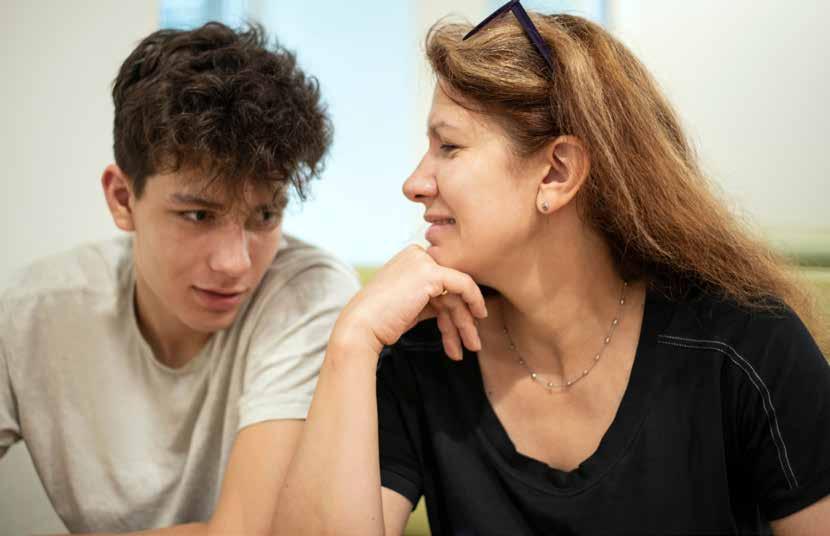
Emma was referred to Family Life’s Strength 2 Strength program, where she worked with the family therapist, clinical psychologist and counsellor advocate.
Through this intervention, a care team was created with John’s MBCP program facilitators and Practice Leader. John was removed from the MBCP due to behaviour concerns, and underwent five additional
individual sessions at completion of the program to hold him accountable for his actions which included ongoing perpetration of family violence and breaches of an Intervention Order.
Emma had been frightened of reporting the breaches to the police for fear of repercussions from John, and received external family violence case management to assist with changing locks and creating safety at home. Through ongoing intervention, holistic and specialised support, Emma was able to report the breaches to the police and had the IVO extended.
Emma was able to return to her day to day functioning and significantly increased her quality of life as her trust in systems and organisations had been restored, Emma and Richard are happy, thriving and empowered to live the life they deserve due to the dedication and hard work of the care team at Family Life.
17
Family Life - Performance and Impact Report | 2021/2022
Family Support Services Snapshot
• promotes safety, stability and healthy development of children, young people and their families through capacity and resilience building strategies
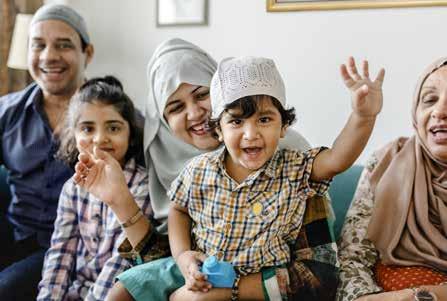
• outreach case management model
• psychoeducation and support linkages to assist families to create sustainable change
• pilot program responding to referrals increasing in complexity and requiring a more intense model of support
• offers an intensive model of IFS support to families for up to 200 hours

18
Our specialist family support services supported 49% of the individuals/ families were supported with three or four different strategies; and 29% of the individuals/families were supported using five or more different strategies. 50% of primary carers/parents16 in our Community Bubs program experienced an improvement in their social support networks. Performance: Impacts: 1,660 individuals during the financial year. 16 This data represents a sample size of participants where an outcome measure was completed at closure
Integrated Family Services (IFS) Integrated Family Services Plus (IFS+)
Family Preservation and Reunification (FP&R)
• an innovative new approach to delivering evidence-based and integrated support to vulnerable children and families, in partnership with Child Protection
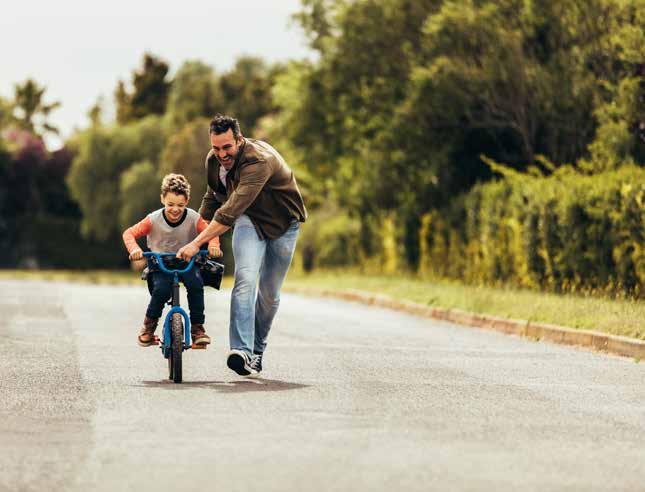
• includes an initial intensive intervention phase followed by a sustained service support phase aimed at preventing at-risk children entering or re-entering Care Services and reunifying children safely with their families
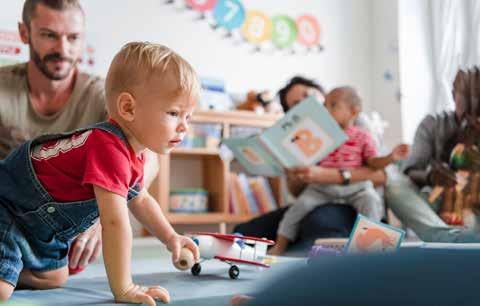
Community Bubs
• strengthening families, aiding parents to overcome risks and challenges in the early stages following their child’s birth or in the final months of pregnancy to prepare for their arrival
• a philanthropically funded outreach program utilising a case management model, supporting the family to link with a range of communitybased support services and increase parenting capacity and child-parent relationship
• aims to create a legacy of change which can be sustained, ensuring the wellbeing of the infant and parent when services are withdrawn
Family Life - Performance and Impact Report | 2021/2022 19
“Strong empirical evidence exists for investing in prevention efforts during the first few years of a child’s life through programs like intensive home-based interventions”
67%
Dr. Deborah Daro (Chapin Hall, University of Chicago)
50% of primary carers/parents in our Community Bubs program experienced an improvement in their mental and emotional health. 100% of primary carers/parents in our Community Bubs program experienced an improvement in their capacity to find a suitable, stable home, and money for essentials for them and their baby.
of young people in our Integrated Family Service experienced an improvement in getting on with school, training or work.

20
Case Study
Sally’s Story
Sally was 23 years of age when referred to Integrated Family Services due to concerns around her mental health impacting her ability to parent her newborn daughter. She was no longer in a relationship with the baby’s father and was living with her mother.
Family Context:
• Sally experienced family violence as a child and in her adult relationships
• Sally was regarded as inadequate and incapable by family members and her baby’s dad
• Sally was diagnosed with schizophrenia at the age of 16 years
• Sally experienced a sense of disconnection and dissociation as a result of her mental health difficulties. She perceived herself as an inadequate parent and expressed the belief that her baby did not like her.
In building a relationship with Sally, her practitioner used the relational ingredients of openness, curiosity, persistence and respect to partner with Sally around how her mental health challenges impacted her ability to connect and parent her baby.
The practitioner collaborated with specialist mental health services to gain further knowledge of the mental illness and its impact on Sally’s daily life and shared with the specialist mental health service information regarding child development, trauma and attachment in order to provide a holistic, appropriate and responsive service.
With our support, Sally has been able to be more present to develop a connection with her daughter. Both experience a sense of mutual delight in each other and the baby turns to Sally for comfort and Sally feels confident and more capable of meeting her baby’s needs.
Family Life - Performance and Impact Report | 2021/2022 21
Family Engagement Spotlight
The newly designed Family Life Children’s Contact Service (CCS) Model provides separated parents and their children with an Enhanced Therapeutic Service. This service model is delivered collaboratively between the Parenting Orders Program (POP) Specialist Practitioners and the CCS workers to address underlying trauma presentations and give additional seamless support to children and parents experiencing other complex issues.
Performance:
Our family engagement services supported
Children who attend these sessions receive specialist trauma informed, therapeutic support as they progress through the CCS sessions. This includes specialist support when children commence visits with their significant family members and referral to other Family Life programs and services where appropriate. For example, where there is a history of a parent having used family violence, practitioners can make internal referrals to the Dads In Focus program.
Separated parents are encouraged to participate in a psychoeducational postseparation parenting group called ‘Stand By Me’. This group can be delivered in person or online. The group assists parents to focus on their children’s needs, comply with their court orders and equip parents with skills to manage and reduce conflict. In addition to the group work, parents and children are offered counselling sessions to support their relationships and reunification. Families are also referred to other support services as needed.
2,124 individuals during the financial year.
This was an increase of 18% compared to the previous financial year.
Impact:*
None of the participants in our Family and Relationships Services (FaRS) program showed symptoms of severe psychological distress at the conclusion of the service, compared to 25% at the beginning of service17.
100% of participants in our Family Dispute Resolution (FDR) service demonstrated the capacity to sort out their parenting arrangements and make it work well, this was an improvement from 25% at the beginning of service.
50% of participants in our Family Dispute Resolution (FDR) service demonstrated the capacity to make their parenting arrangements work well for their child/ren, this was an improvement from 25% at the beginning of service.
This data represents a sample size of participants where an outcome measure was completed at closure.
22
u 17
Allira’s Story
Allira, a 22 year old indigenous woman, was referred to our Family Relationship Centre Financial Counsellor by the Homeless Youth Assistance Program. Allira had a history of financial hardship, family violence and homelessness, and presented with significant debt relating to being unwittingly caught up in a recent ATO scam as well as a Buy Now Pay Later debt.
Our financial counsellor was able to support Allira to connect with legal avenues regarding the ATO debt, as well as drafting a strong application outlining her circumstances for the secondary debt.

Allira was keen to study towards a certificate course, and our counsellor was able to guide her with information about of an appropriate scholarship through ICAN Learn. With additional support from the Homeless Youth Assistance case worker, Allira applied for and was successful in being granted the scholarship. A laptop was also provided to support her studies.
A great outcome was achieved for Allira with Buy Now Pay Later agreeing to waive her debt in full on compassionate grounds. Allira has gained the confidence to commence her certificate course and is feeling positive about the future.
23
Family Life - Performance and Impact Report | 2021/2022
Social Enterprise Spotlight
Connection through Volunteering:
“The act of volunteering, particularly for older adults, is well researched and has been found to be associated with many positive health and well-being outcomes, including improved physical and mental health, increased physical activity and socialisation, the development of personal resilience against stress, gains in knowledge and skills, and reduced mortality risk18”
Loneliness affects one in four Australians and is associated with depression, anxiety, poor quality of life, poor sleep, and poor physical health. We adapt our programs to support social connection but more broadly to develop communities that care for individuals and families. Our community connection approach through our Community Op Shops recognises the value of relational health, as important to social and emotional wellbeing. Our social enterprise stores, which function as community hubs, have a strong focus on volunteerism and involvement in activities promoting social connection as mechanisms to overcome isolation.
Post lockdowns, re-engagement of our volunteers was a significant focus with numerous activities
95% of our volunteers
reported a good to excellent sense of connection to their fellow volunteers, and 95% indicated a good to excellent connection with their supervisor/manager.
undertaken. We had morning teas in all our stores to welcome back, or encourage volunteers, some of whom experienced isolation and fear due to COVID-19. We provided training sessions in Rights & Responsibilities of a Volunteer, and Communication Skills and Dealing with Difficult Customers. We continued the Craft Group and Gardening Club that was initiated during COVID-19 lockdowns. In April 2022, we hosted a high tea & fashion event for 200 guests. Volunteers from each store participated in the successful event, planning, securing prize donations, modelling, arranging decor and setting up. Some volunteers expressed that they gained the confidence to step out of their comfort zone and stated that being asked and encouraged to model was one of the highlights of their life.
24
“A positive and happy environment promoting inclusion & respect for everyone”.
“Very supportive environment, friendly and I feel my work & efforts are valued”
“A happy atmosphere with strong values & ethics promoted by Family Life”
“Always a good feeling when heading to the Highett shop to work”
18 Crittenden. (2018).
Connection through Community Partnerships:
“Effective partnerships leverage the strengths of each partner and apply it strategically to the issue at hand. It might take more work, and it might take longer, but strong partnerships build the relationships, shared understanding, and collective focus to make lasting progress19”.
We partnered with and would like to thank:
• Hampton & Highett Community Centre for assisting with volunteer training venues
• Chatty Cafe - hosted in our Cheltenham store to support and connect those experiencing loneliness and social isolation
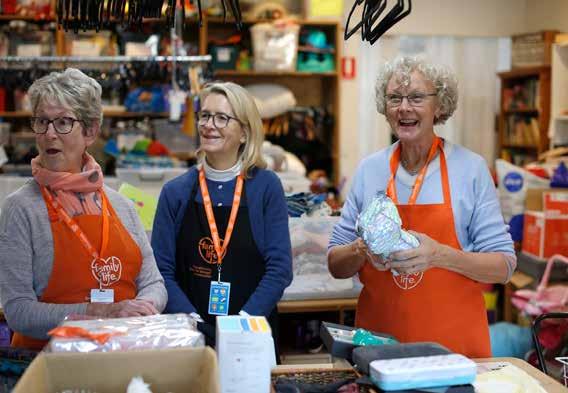
• Country Women’s Association for assistance in catering for events
• Spotlight who kindly donated stylish homewares for us to sell in our social enterprise stores;
• Dress for Success - supporting their mission to empower women to achieve economic independence by providing a network of support, professional attire and the development tools to help women thrive in work and in life.
Family Life - Performance and Impact Report | 2021/2022 25
Social Enterprise Highlights contributing to 20,249 hours We sold 1,299,336 items reducing waste in landfill and providing low-cost goods for others We completed 63,142 transactions Over 70,200 individuals visited our stores to access supports and goods from Family Life 95% of customers entering our store make a purchase 223 Volunteers participated in our Social Enterprise program, We opened our Mordialloc Store at 537 Main St, Mordialloc 19 Community Builders. (2017).
Conclusion
Despite the significant challenges faced by the Covid pandemic, Family Life continued to provide impactful services to the community throughout the year. Families, children and young people were supported through online and face-to-face services, and our social enterprise stores were a place of community connection for many.
We particularly made gains in our family violence services where we continued to strengthen and grow our specialist knowledge and expertise in working with fathers who have used violence.
During the year, Family Life embraced the opportunity to continue to strengthen our ways of working to deliver even greater impact for the community. This included launching a traumainformed care framework and clinical governance framework to guide our holistic service delivery. We continued to measure outcomes and evaluate our services to ensure our evidence-based practice and applied lessons learned for continuous quality improvement. We also invested in our people’s capability, and the future community services
References
workforce, by providing leadership training for our people managers and commencing a graduate social work program that included ongoing coaching and mentoring by our experienced practice leaders. We shared our knowledge with the sector through conference presentations and other formal and informal gatherings.
The year was challenging in many ways for Family Life and for the communities and people we serve. Despite the effects of Covid, Family Life continued to strive for impact and to deliver high quality, effective services to our clients and the community. As Australians emerge from what we hope is the most serious part of the pandemic and continue to reconcile the changes we now face in our day to day lives, Family Life will continue to be a calming presence in the communities in which we work, listening and learning for how we can best support families, children and young people to thrive.
Community Builders. (2017). The value of partnerships in Community Development. Retrieved from: https://communitybuilders.org/insights/the-value-of-partnerships-in-community-development/ Crittenden, Jennifer. (2018). Volunteering as a Strategy for Combatting Social Isolation. 10.1891/9780826146991.000
Fatherhood Engagement Research Project, SA. https://wvpbis.org/wp-content/uploads/Self-Care-During-the-Coronavirus-Pandemic.pdf
Jeanette Schmid, Holly Bradley. (2022) The Impact of COVID-19 on (Remaking?) Social Service Delivery: An 18 Month Review. Journal of Evidence-Based Social Work 0:0, pages 1-20.
Loneliness, housing and health – building community connections in Bayside Peninsula (2019). Accessed from: https://prevention.health.vic.gov.au/blog/posts/loneliness-housing-and-health-building-community-connections-in-baysidepeninsula NonparametricTests. https://sphweb.bumc.bu.edu/otlt/mph-modules/bs/bs704_nonparametric/BS704_Nonparametric5.html
Psychology Today. (2020). The Pandemic Toolkit Parents Need. Retrieved from: https://www.psychologytoday.com/au/blog/ pulling-through/202004/the-pandemic-toolkit-parents-need
Usher K, Bhullar N, Durkin J, Gyamfi N, Jackson D. Family violence and COVID-19: Increased vulnerability and reduced options for support. Int J Ment Health Nurs. 2020 Aug;29(4):549-552. doi: 10.1111/inm.12735. Epub 2020 May 7. PMID: 32314526; PMCID: PMC7264607.
Vaismoradi, M., Turunen, H.Bondas, T. (2013). Content analysis and thematic analysis: Implications for conducting a qualitative descriptive study, Nursing and Health Sciences, 15, 398–405
26

27 Family Life - Performance and Impact Report | 2021/2022
Family Life
197 Bluff Road
Sandringham, Victoria Vic 3191
Phone: +61 3 85995433
Email: info@familylife.com.au www.familylife.com.au
Follow us on Social Media
FamilyLifeAU familylifeau FamilyLifeOpportunityShops auFamilyLife familylifeau























